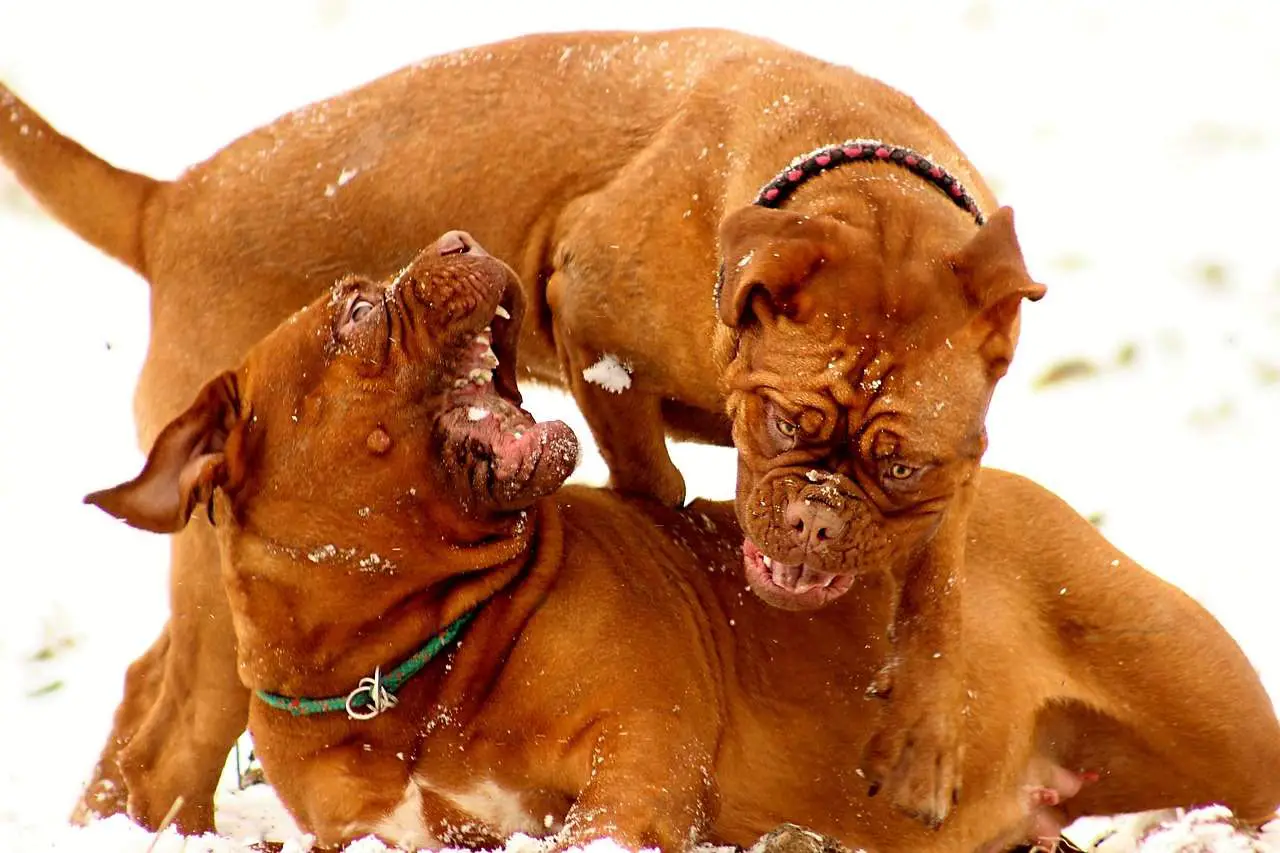Dogue de Bordeaux Temperament – Are they Dangerous?

Although all dogs’ personalities and temperament will have unique elements, the Dogue de Bordeaux temperament is similar to one that many Mastiff breeds share. They are strong willed, a bit stubborn and protective of the family. However, a point of difference in this breed is their docile and family driven, wholesome nature as they mature.
Many people believe that the appearance of the French Mastiff, with its intimidating characteristics such as broad chest, stern expressions, wrinkly face, large jowls and big teeth correlate to “aggressive”. This simply isn’t the case.

It’s not to say that the Dogue de Bordeaux isn’t dominant, it certainly can be. However, in general, the Dogue de Bordeaux is a calm companion that is alert to trouble and courageous in its desire to protect loved ones.
Many experienced dog handlers love and adore this breed and a common complaint is usually aimed at how unjust it is that their ancient French native breed has such a short lifespan. However, if you have come to terms with this fact and are still committed to owning the French Mastiff, and understand the importance of training and socialisation as part of being a responsible dog owner then stick around as we uncover the key components of their temperament and character.
| Temperament Characteristic | Score |
| Affection Level | High |
| Socially Friendly | Medium |
| Family-Friendly | High |
| Pet-Friendly | Medium |
| Playfulness | Medium |
| Energy Level | Medium |
| Trainability | Medium |
| Intelligence | Medium |
| Tendency to Bark | Low |
Dogue de Bordeaux Temperament: Is the Dogue de Bordeaux Affectionate?
The Dogue de Bordeaux is a very sensitive breed. They become very attached to their owners and direct family members. This makes the breed a great choice of companion for experienced dog owners that can handle their size.
The dogs (usually male) can show signs of dominance in early age and adolescence, however with good training and socialisation, the breed typically grows out of this and tends to have a very calm persona as they age.
It should be stated that owners also have a calm and confident presence, know how to take leadership and can show consistency in commands, especially when adopting obedience training early on. If this isn’t the case, a more dominant Dogue personality may start to take charge, which can cause anxiety for both humans and dogs.
Is the Dogue de Bordeaux easy to socialise?
Their size and appearance can lead to other dogs and humans feeling threatened by them, however the Dogue de Bordeaux is often a sweet giant that is willing to socialise and play.
The French Mastiff does take well to socialisation if done from an early age. We fully endorse puppy training and socialisation classes as well as introducing them to any other dogs you may have in the family from an early age.
It must be said that the breed does have a moderately high prey drive, so when it comes to cats or other smaller animals you may want to think twice. That said, there are also many Dogue de Bordeauxs that are not fussed by smaller animals so this should be treated on a case by case basis.
Good socialisation from an early age is critical for many dog breeds, the Dogue de Bordeaux is no exception to that.
Does the Dogue de Bordeaux make a good family dog?
Dogues tend to be very loving, loyal, family orientated pets. They are protective, and good with kids around the house provided the children are not overly rough and provocative. When training your dog from an early age, it’s also worth teaching your children how to interact and play with such a large breed.
If you have small children then you may want to reconsider a decision to purchase or rescue a Dogue de Bordeaux. This has nothing to do with the Dogue de Bordeaux being aggressive, but more so that their excessive size and power can pose risks. It has to be said, they’re typically not the most graceful of dogs and sometimes have a clumsy side.
Outside of this, smaller children should certainly not be taking a Dogue de Bordeaux for walks. Their power is likely too much for a child and if they get over-stimulated by smells, sexual or prey drive then they might be hard to control.
Is the Dogue de Bordeaux Friendly Towards Other Animals & Pets?
This is a tricky one. Many Dogue de Bordeaux are completely fine with other pets. From experience my Dogue de Bordeaux shared company with a Basset Hound, a West Highland Terrier and occasionally a domestic tabby cat. It was gentle and playful with them all.

However, not all personalities are the same. Some Dogue de Bordeaux may have a higher prey drive than others. Whereas some may not be fully aware of their size, power and dominance which can cause other pets anxiety and at worse physical harm.
How playful is the Dogue de Bordeaux?
The French Mastiff is moderately playful. Play time is a great way to build a strong bond between owner and dog. As a member of the worker group, Dogues do love tasks and odd jobs. If there is a way that you can make this more playful, then your Dogue de Bordeaux will love you for it.
When investing in play time with your Dogue, you should keep in mind that you’re going to need to purchase fairly robust toys. They have a powerful bite and large teeth that will rip most generic toys to pieces in a very short amount of time. Recommendations would be a thick rope and a solid ball (or 10) for fetch. If bites are something that worry you, you can check out our Dog Bite Statistics guide, which tells you everything you need to know about the risks of dog bites.
A final tip is to limit intensive play to no more than 30 mins. The breed does develop some unfortunate health concerns with excessive exercise that is worth keeping an eye on. These are things such as overheating and joint issues.
How Energetic is the Dogue de Bordeaux?
The energy levels of the Dogue de Bordeaux is more on the moderate side, sometimes even a bit below. They do enjoy walks and playtime. However, they also enjoy lounging around the place with you.
Their moderate energy levels also lend to their docile nature as they mature. This isn’t a high energy breed by any stretch, which may be a good thing for many owners when you consider the size and power of it.
How hard is the Dogue de Bordeaux to train?
You can read our guide on Dogue de Bordeaux training here, which gives more of an extensive overview. However, in general the breed scores a medium when it comes to trainability.
They have a desire to please their owners which lends itself well to training. However, their size and power can also lead to them being strong-willed and stubborn, even domineering.
That said, an experienced dog owner can grasp Dogue de Bordeaux training fairly easily. A mixture of at home training and puppy obedience training, alongside socialisation should give you many of the tools needed when training this breed.
It has to be said, they are at their calm, loving, docile best when well trained. By not committing to training, you are depriving yourself of all the best qualities that the Dogue de Bordeaux has become famous for.
How Intelligent is the Dogue de Bordeaux?
The Dogue de Bordeaux is a fairly intelligent breed of dog. They are an ancient breed that is said to have made its way to France as part of the Roman war machine. Throughout hundreds of years, the breed has taken on numerous roles from fighter to livestock protector, to pulling carts of meat from farm to butcher.
As protective and guardian instincts kick in, the Dogue is calm but alert. They have a great sense of danger and are able to attune to the emotions of their owners.
As a member of the worker group, the dog is also receptive to jobs and responds well to obedience training without an excessive amount of treats. That said, owners should always be patient as all dogs have a different personality, slightly unique quirks in what motivates them and so on.
Does the Dogue de Bordeaux bark a lot?
No, the Dogue de Bordeaux does not tend to bark a lot. The docile nature of the breed means that they are relatively calm throughout the day. However, the breed does have a good sense for threats and dangers and will bark to scare away or to alert others.

As mentioned throughout, the breed is protective. This means, these descendants of war dogs make great guard dogs. They will go on the offense if needed.
So… is the Dogue de Bordeaux dangerous?
Overall, the Dogue de Bordeaux is not a dangerous dog. By their very nature, they are a vigilant and protective breed. However, their calm nature means that they tend to be a kind and affectionate breed that poses little dangerous threat to humans and most other animals.
Again, we encourage strong commitment to socialisation and training throughout the dogs lifetime. Responsible dog owners that invest in these areas tend to raise wonderfully behaved companions that are a joy to be around.
Many judge the breed on its intimidating looks which can lead to unfortunate perceptions and sometimes totally unjustified ownership laws in certain jurisdictions, such is the case for other Mastiff breeds such as the Cane Corso.